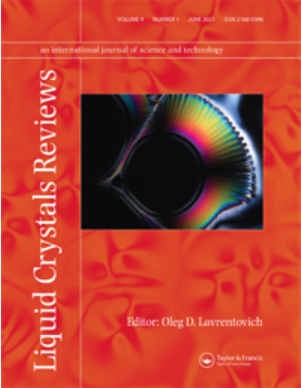向列式中的电致模式以及如何避免它们
IF 4.2
3区 材料科学
Q2 CHEMISTRY, PHYSICAL
引用次数: 51
摘要
液晶中的电场诱导图案已经被观察和研究了大约50年。在此期间,描述了在不同条件下检测到的各种结构;理论描述也与实验并行发展,并发表了大量论文。人们对这个话题的兴趣没有消失是由于几个因素。首先,大多数研究新型(甚至是众所周知的)液晶的实验学家迟早会为了不同的目的而应用一个电场,作为回应,经常(可能是不希望的或意想不到的)不得不面对图案的出现。其次,理解粘性、各向异性流体中规则图案形成机制的复杂性是一项极具挑战性的理论任务。第三,显示制造或其他应用领域的专家也对结果感兴趣;要么是为了利用它们,要么是为了避免场诱导模式。在这篇综述中,我们试图对大量已发表的结果进行系统的概述,重点关注最近的成就,关于三种主要类型的电场诱导模式:Freedericksz跃迁期间的瞬态模式,挠性电畴和电对流。由于不稳定性机制的不同,可以产生各种各样的图案形态。我们讨论了这些机制的物理背景,具体说明了它们可能有效的条件,讨论了这些模式的特征,并总结了由频率、电压或温度变化引起的形态转变的可能性。特别强调某些主题,这些主题最近从实验和理论的角度得到了增强的兴趣,如超低频率或非正弦(叠加)波形驱动,以及缺陷和嵌入胶体颗粒的动力学。为了帮助这个领域的新手,我们也提到了一些尚未解决的问题,这些问题可能需要进一步的实验和/或理论研究。本文章由计算机程序翻译,如有差异,请以英文原文为准。
Electrically induced patterns in nematics and how to avoid them
ABSTRACT Electric field-induced patterns in liquid crystals have been observed and studied for about 50 years. During this time, a great variety of structures, detected under different conditions, have been described; theoretical descriptions were also developed parallel with the experiments and a huge number of papers have been published. The non-vanishing interest in the topic is due to several factors. First, most experimentalists working with new (or even well-known) liquid crystals apply sooner or later an electric field for different purposes and, as a response, often (maybe undesirably or unexpectedly) have to face with emergence of patterns. Second, understanding the complexity of the formation mechanism of regular patterns in a viscous, anisotropic fluid is an extremely challenging theoretical task. Third, specialists in display fabrication or in other applications are also interested in the results; either to make use of them or in order to avoid field-induced patterns. In this review, we attempt to provide a systematic overview of the large amount of published results, focusing on recent achievements, about the three main types of electric field-induced patterns: transient patterns during the Freedericksz transition, flexoelectric domains and electroconvection. As a result of different instability mechanisms, a variety of pattern morphologies may arise. We address the physical background of the mechanisms, specify the conditions under which they may become effective, discuss the characteristics of the patterns, and summarize the possibilities of morphological transitions induced by frequency, voltage or temperature variations. Special emphasis is given to certain topics, which recently have gained enhanced interest from experimental as well as theoretical point of view, like driving with ultra-low frequencies or non-sinusoidal (superposed) waveforms, and the dynamics of defects and embedded colloidal particles. Assisting newcomers to the field, we also mention some, yet unresolved, problems, which may need further experimental and/or theoretical studies.
求助全文
通过发布文献求助,成功后即可免费获取论文全文。
去求助
来源期刊

Liquid Crystals Reviews
CHEMISTRY, PHYSICALCRYSTALLOGRAPHY&n-CRYSTALLOGRAPHY
CiteScore
7.60
自引率
5.90%
发文量
8
期刊介绍:
Liquid Crystals Reviews publishes review articles on all aspects of liquid crystal fundamentals and applied science, including experimental and theoretical studies of physical and chemical properties, molecular design and synthesis and engineering of liquid crystal devices. The Journal fosters cross-disciplinary exchange of ideas, encouraging authors to present material at a level accessible to specialists from other fields of science and engineering. Liquid Crystals Reviews provides the scientific community, in both academia and industry, with a publication of standing, guaranteed by the Editors and by the International Editorial Board who are active scientists in the worldwide liquid crystal community.
 求助内容:
求助内容: 应助结果提醒方式:
应助结果提醒方式:


